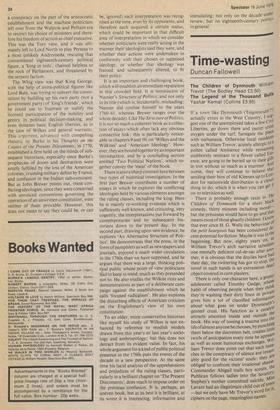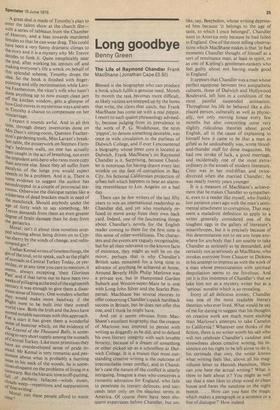Time-wasting
Duncan Fallowell The Children of Dynmouth Trevor (The Bodley Head £3.50) The Legend of the Thousand Bulls Yashar Kemal (Collins £3.95) If a town like Dynmouth (Teignmouth actually exists in the West Country, I sag: gest one of the unemployed takes a few Civil Liberties, go down there and pump sorne oxygen under the turf, fumigate the place with euthanasia. Otherwise local residents such as William Trevor, acutely allergic to a pollen called Ambience while remainolg stubbornly resistant to a flower called Ess" ence, are going to be buried up to their VHS in trot without so much as a murmur. Ana worse, they will continue to believe that sending their bins of old Kleenex up to London for nationwide distribution is a clever thing to do, which it is when you can get It on to television as well. There is probably enough resin in 711,e. Children of Dynmouth for a short biacic comedy, thirty minutes including moral-but the prissiness would have to go and that means most of those ghastly children. I know that ever since H. G. Wells the behaviour of the petit bourgeois has been considered decent potential for fiction. Maybe it was in the beginning. But now, eighty years on, as William Trevor's arch narrative tabulates one mentally deficient cul-de-sac after ad " ther, it is obvious that the doylies have ha their day, the twittering has got to stoP,the, novel in such hands is an extraneous deau object covered in corn plasters.
There is only one character here, a greasY
adolescent called Timothy Gedge, Yiht3s,,e habit of observing people when they thin's they're washing their dirty linen in private gives him a lot of classified informatl°,11 about what goes on under Dynmouth s genteel crust. His function as a catal)st attracts attention inside and outside the book. His way of tossing a trauma into he life of almost anyone hechooses, by punching them below the discretion belt, creates little twirls of anticipation every time he aPPea.r,s as well as some humorous exchanges. WI' liam Trevor does point out that such breaches in the conspiracy of silence are irlYarl: ably good for the victims' souls: they al.' obliged to confront their irrational .shartlei Commander Abigail trails boy scouts, the Publican follows ladies into the lavatory; Stephen's mother committed suicide, Nits_ Lavant had an illegitimate child out of tow.t" —but we only have Mr Trevor's word for ciphers on the page, meaningless names.
A great deal is made of Timothy's plan to enter the talent show at the church fete— with a series of tableaux from the Chamber of Horrors, and a bias towards murdered females so that he can wear drag. This could have been a very funny dramatic climax to the story and it is a mystery why Mr Trevor decides to funk it Quite inexplicably near the end, after working his sprouts off and making everyone's life a wreck on behalf of this splendid scheme, Timothy drops the idea. So the book is finished with finger Pointing and silly recrimination while Lavinia Featherston, the vicar's wife who hasn't done anything up to now except clean jam off the kitchen window, gets a glimpse of how God moves in mysterious ways and sees in Timothy a chance to compensate on her miscarriage.
I expect it sounds awful. And in all this time, through dreary inventories done on Mrs pass's sitting-room, Quenten Featherston's gardening tools, Miss Lavant's breakfast table, the posterwork on Stephen Fleming's bedroom walls, no one has actually been caught in the act of breathing, not even the impudent anti-hero who rates more copy than anyone else. Since they all suffer from Paralysis of the lungs you would expect Speech to be a problem. And it is. There is some evidence to suggest the author has eavesdropped in a couple of provincial tearooms. Otherwise the dialogue rattles like a Wilderness of dead bracken much in need of the matchstick. Should anybody under the age of forty wish to say something, Mr Trevor demands from them an even greater degree of brain damage than he does from the geriatrics.
Moral : isn't it about time novelists stopped whining about being driven on to Cyprus sherry by the winds of change, and rediscovered gin ?
Yashar Kemal writes of timeless things, the gin of the soul, so to speak, such as the plight of nomads in Central Turkey Today, or yesterday, or at any time you care to mention, it seems, always excepting 'their Glorious ilase and if that turns out to have been two weeks of pillaging at.the end of the eighteenth Century it was enough to give them a disastrous sense of history. One wonders whether they would make more headway if the Plight were to be built into their overall World view. Both the Irish and theJews have scored notable successes with this approach. For a start it has given them a wonderful sense of humour which, on the evidence of The Legend of the Thousand Bulls, is something in very short supply among the nomads Of Central Turkey. Like most primitives they have an overdeveloped sense of pride instead. Mr Kemal is very romantic and passionate about what is probably a burning issue in his neck of the woods, he is sometimes eloquent on the problems of living in a ftimewarp. But the hieratic tone is off-putting, _u,Il of pathetic fallacies—winds moan, Clouds weep—repetitions and suppurations of 'fine writing'. Moral : can these people afford to waste time?



































 Previous page
Previous page